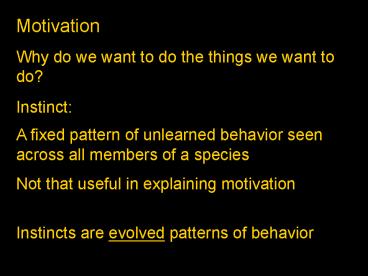Motivation - PowerPoint PPT Presentation
1 / 27
Title:
Motivation
Description:
Anorexia Nervosa: - obsession with weight loss - severe restriction of food intake ... Bulimia Nervosa: - binge eating - compensatory vomiting, laxitive use, ... – PowerPoint PPT presentation
Number of Views:20
Avg rating:3.0/5.0
Title: Motivation
1
Motivation
Why do we want to do the things we want to do?
Instinct
A fixed pattern of unlearned behavior seen across
all members of a species
Not that useful in explaining motivation
Instincts are evolved patterns of behavior
2
Motivation
Drive-Reduction Theory
Homeostasis the maintenance of a steady,
non-zero, baseline state
- e.g., regulation of body temperature
Loss of homeostasis leads to "drive" to regain it
(e.g., thirst, feeling cold)
Drive-reducing behaviors (e.g., drinking) restore
homeostasis
3
Motivation
Drive-Reduction Theory
Incentives
Through learning, stimuli that are paired with
decreases (or increases) in drive states can
acquire positive (or negative) incentive
properties
These incentives can also motivate behavior
4
Motivation
Optimum Arousal Levels
Drive Arousal
Some level of arousal seems to be desirable
Drive for arousal??
5
Motivation
Maslow's Heirarchy of Needs
6
Motivation
Hunger
Physiology
- stomach contractions
- blood glucose / insulin balance
- hypothalamus (HT)
- release of orexin ('hunger hormone') from
lateral HT
- ventromedial HT activity stops eating
7
Motivation
Hunger
Physiology
"Opposing" hypothalamic systems may regulate
glucose ? fat conversion
8
Motivation
Hunger
Physiology
- set-point theories
- how much you should weigh is written
somewhere in your biology
- generally, not subject to change
9
Motivation
Hunger
Physiology
- settling-point theories
- your weight is determined by a combination of
factors
- food intake
- food availability
- energy expenditure
- current weight
10
Motivation
Hunger
Psychology
External (e.g., availability) and internal (e.g.,
hunger) motivations to eat
- some people more responsive to external stimuli
- these people tend to have the most problems
with overeating
11
Motivation
Hunger
Psychology
Taste Preferences
- some tastes are universally liked (sweet, salty)
- some preferred tastes culture-specific (whale
blubber, dog meat, insects)
- neophobia (adaptive behavior)
12
Motivation
Hunger
Psychology
Taste Preferences
- as discussed previously, learning can affect
our responses to various tastes
13
Motivation
Hunger
Psychology
Eating Disorders
Anorexia Nervosa
- obsession with weight loss
- severe restriction of food intake
- distorted self-image
- brain/organ damage, death
14
Motivation
Hunger
Psychology
Eating Disorders
Bulimia Nervosa
- binge eating
- compensatory vomiting, laxitive use, fasting,
exercise
- weight range within/above normal
15
Motivation
Hunger
Psychology
Why are eating disorders far more common in
females than in males?
16
Motivation
Sexual Motivation
The Kinsey Report (1948)
- what is "normal" sexual behavior?
- most males, 50 of females report premarital
sexual intercourse
- most females, almost all males report
masturbating
- normal sexual behavior has a pretty wide
range...
17
Motivation
Sexual Motivation
The Kinsey Report (1948)
- methodological issues
- motivational issues
18
Motivation
Sexual Motivation
Masters Johnson (1966)
- description of the sexual response cycle
- cycle similar in males and females
- methodological issues
19
Motivation
Sexual Motivation
Masters Johnson (1966)
4 stages of the sexual response cycle
1. excitement phase
2. plateau phase
3. orgasm
4. resolution phase
20
Motivation
Sexual Motivation
Hormones and Sex
Hormones induce development of differential sex
characteristics
In most mammals, hormones direct sexual activity
(particularly in the female)
Not so simple with humans
21
Motivation
Sexual Motivation
Hormones and Sex
Interest in sexual activity linked to
testosterone in both male and female humans
In most other mammals, female sexual activity is
linked to estrogen levels, which peak at ovulation
22
Motivation
Sexual Motivation
Sexual Responses to External Stimuli
Audio tapes played for both males and females
Tape 1 erotic (sexually explicit)
Tape 2 romantic (no physical contact)
Tape 3 erotic/romantic mix
Tape 4 neutral (non-sexual content)
23
Motivation
Sexual Motivation
Sexual Responses to External Stimuli
Physiological measures of arousal (genital blood
flow) recorded
- which tape produced the most arousal in men?
- which tape produced the most arousal in women?
24
Motivation
Sexual Motivation
Sex and Culture
25
Motivation
Sexual Motivation
Sex and Culture
- birthrate among married women decreasing
- birthrate among unmarried women increasing
26
Motivation
Sexual Motivation
Sex and Culture
- humans are usually capable of sexual
reproduction by age 12-14
- why wait?
27
The Questions
- In general, difficult tasks are performed better
when arousal levels are low. - Which brain structure has been shown to play a
major role in the emotional response of fear?
-the amygdala































